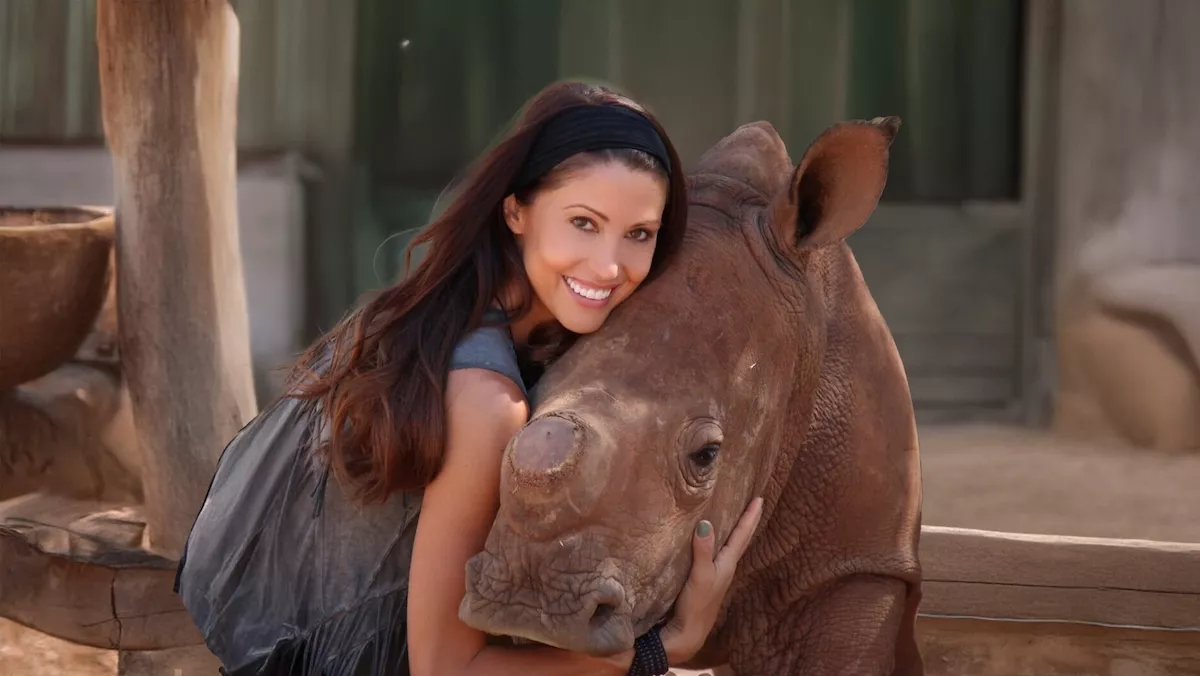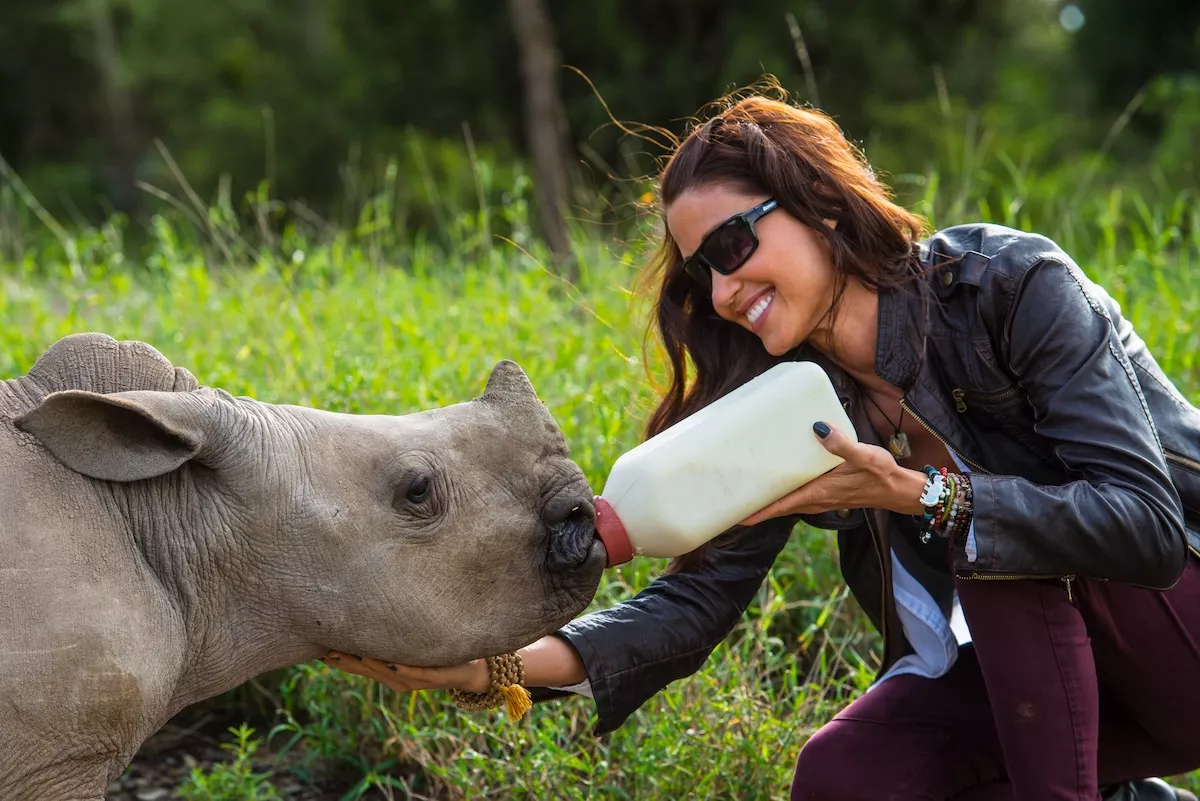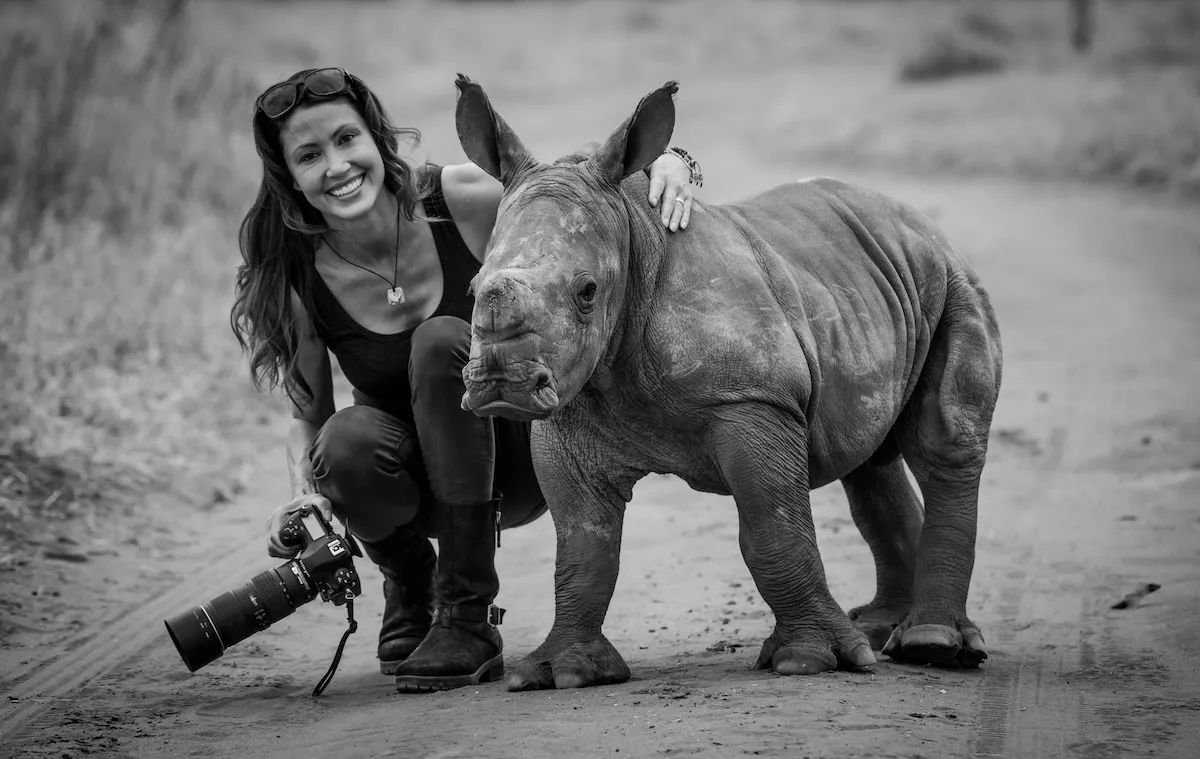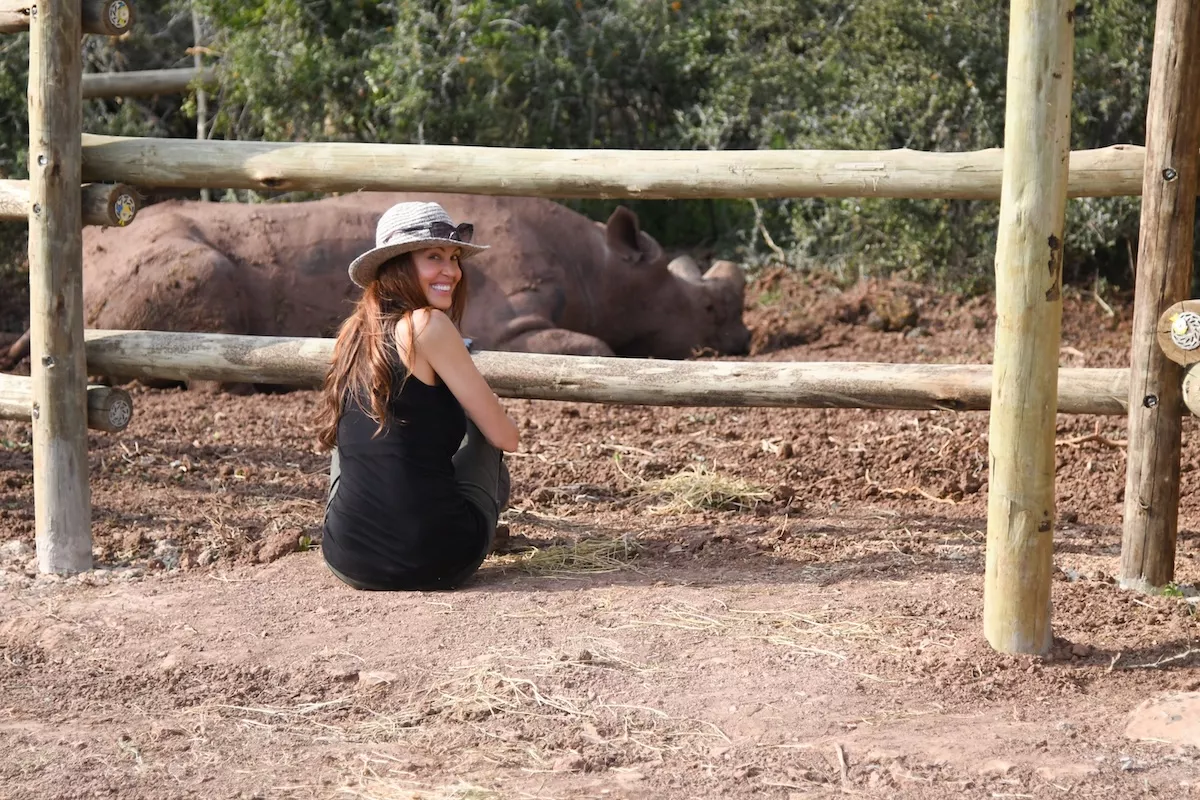You may know her as the magnetic star of American Pie or the elegant contender from Dancing with the Stars, but today Shannon Elizabeth is playing the role of a lifetime — defending some of the planet’s most endangered species.
What began in 2001 as Animal Avengers, a dog and cat rescue born out of her Los Angeles apartment, has since transformed into the Shannon Elizabeth Foundation (SEF), a fully registered 501(c)(3) in the U.S. and a public benefit organisation in South Africa, where Shannon now lives full-time.
Her journey has led to the creation of the Khusela Endangered Wildlife Sanctuary, a safe haven for black rhinos and other vulnerable species. Inspired by the rescue of Munu, a blind rhino with nowhere safe to go, the sanctuary has become a model for ethical, community-driven conservation. It’s not just about saving animals, it’s about empowering local voices, funding PhDs for young African women in science, and showing that hope and protection can grow in even the harshest terrains.
In this exclusive interview, Shannon opens up about the life-changing moment that led her away from the spotlight and into the wild, the mission behind her sanctuary, and how poker is helping her fight poaching. It’s a candid look into a life of transformation, resilience, and purpose—one that may just inspire you to take action too.
With a diverse career spanning Hollywood, professional poker, and wildlife conservation, what’s one surprising fact about you that your fans might not know?
A lot of people assume I completely left Hollywood, but storytelling is still a huge part of my life, it’s just evolved. Whether it’s through conservation, poker, or directing and/or producing content to raise awareness, I’m always looking for creative ways to make an impact. Another thing that surprises people is that I’m a total health geek! I’m obsessed with longevity, how we can optimise our health while also caring for the planet so that we can care for the planet for a lot longer. I’ve even created a constantly evolving supplement routine with nearly 50 different supplements. I don’t take all of them every day, but I definitely try.
You transitioned from Hollywood to conservation work. Was there a particular moment or realisation that made you step back from acting?
I started my charity in 2001 as a dog and cat rescue called Animal Avengers, but I was searching for ways to expand its impact and help more animals on a larger scale. As I began learning about conservation, I found myself drawn to the work being done in South Africa. Then one night, while living in New York, I had an experience that changed everything.
I was getting ready for dinner when something in my head told me to check Instagram. I did, and that’s when I came across a video that shook me to my core. A ranger was scanning the ground in front of him, showing what at first looked like scattered remains. Then I realised: it was an elephant, brutally hacked apart for her tusks. Her trunk lay off to the side, and her face was barely recognisable. And then I heard the ranger say, “This poor baby has been out here all night suffering.” As the camera moved closer, I saw her move, she was still alive.
That moment hit me like a ton of bricks. I had no idea that poachers were leaving these animals to die like this. I had always assumed they were killed first, but I learned that to avoid drawing attention with a gunshot, poachers often disable them and leave them to bleed out. The horror doesn’t stop there, many of these killings happen in front of the animals’ babies, who try to save them, get injured or killed in the process, or stay by their side, refusing to leave. When predators come to feed, they often take the grieving baby too.
How do you learn about something like this and not do everything in your power to stop it? That was the moment I knew I had to dedicate my life to protecting these animals.
What are your projects and main activities now?
Our biggest project is the Khusela Endangered Wildlife Sanctuary, inspired by Munu, a blind, rare, critically endangered black rhino who needed a safe home. We fell in love with him and found land with the perfect vegetation for him to thrive. We secured it, built four large camps where he roams by day, and an enclosure that provides care and protection at night.
Now that Munu is safe, our focus is expanding the sanctuary to support broader conservation. We make sure Munu has everything he needs to stay healthy and happy. Seeing him so happy and content in his new home is a powerful reminder of why we do what we do. We work with local parks and organisations protecting his subspecies, while developing infrastructure to make a greater impact.
We’ve also integrated our One Woman’s Legacy scholarship into the sanctuary. The scholarship is designed to educate and mentor young African women to become leaders in conservation within the wildlife economy. I am very proud that this year we will have our first PhD graduate.
Rhino Conservation & Wildlife Protection
Could you elaborate on your impactful contributions to wildlife conservation in Africa, particularly your role with the Khusela Endangered Wildlife Sanctuary?
Growing up in Texas, I always imagined living on a large piece of land surrounded by animals, but I didn’t yet know about conservation or the importance of protecting nature. I assumed it would be on a farm, but that vision has evolved into something much more meaningful.
For us, Khusela is not just a sanctuary; it’s a model for sustainable conservation. Our goal is to protect animals and the environment while actively involving local communities in conservation efforts. We currently care for a wide variety of species, including Leopards, Black Rhinos, Hyenas, Jackals, Caracals, Mongooses, Genets, Porcupines, Monkeys, Baboons, Scrub Hares, Aardvarks, Warthogs, Kudu, Eland, Duikers, Dung Beetles, and many more.
You’ve dedicated a lot of time to rhino conservation. Can you share a personal experience with a rhino?
Together with the police and investigators, I flew countless times to inspect poaching crime scenes, witnessing the brutal slaughter of innocent rhinos for their horns. It was horrifying, these magnificent creatures being killed for something as trivial as their horns. It’s absurd to think that rhinos are killed for something as insignificant as our hair or fingernails. And tragically, these horns are worth more on the black market than gold or heroin. A single rhino horn can fetch up to half a million dollars, depending on its weight.
It’s devastating to think about how many pregnant females have been found dead, it’s an unimaginable tragedy.
I know your husband, Simon, works actively with your charity. Can you tell us about you’re his dynamic history?
My husband, Simon Borchert, is the son of Peter Borchert, the founder of Africa Geographic. Peter was a pioneer in conservation journalism, often the first to publish bold articles about conservationists with unconventional ideas or theories that others were hesitant to share. Simon grew up surrounded by some of the most influential figures in conservation, from Ian Player to John Varty to Frans Lanting. He now uses his expertise to encourage people to be more conscious in their protection of the planet and all who call it home.
How concerned are you about the survival of this species?
Black Rhinos are listed as Critically Endangered on the IUCN Red List of Threatened Species. At the current rate of poaching, they could absolutely disappear within our lifetime. The situation has become so dire that private landowners are now a crucial last line of defense, investing heavily to protect, and in some cases, even hide, their rhinos from poachers. But I refuse to accept extinction as an inevitability. If we act now, we can change the trajectory for rhinos. It requires urgent intervention, substantial resources, and global awareness. Every decision we make today, whether through conservation efforts, policy changes, or public engagement, will determine whether future generations will know rhinos as living, breathing animals or only as images in history books.
What animals would you say are suffering the most from poaching?
Beyond rhinos, elephants remain one of the most heavily poached species, slaughtered for their ivory despite international bans. Big cats, including tigers and lions, also face significant threats from poaching.
Bones, skins, and other parts of big cats are traded for medicines, luxury goods, and status symbols, driving poaching and captive breeding that threaten their survival despite global conservation efforts.
But let’s be honest, the United States plays a major role in the global wildlife trade, both legal and illegal. It is one of the world’s largest markets for wildlife and wildlife-derived products, a fact that often goes unnoticed. The U.S. is also one of the biggest importers of lion, elephant, and rhino trophies from Africa.
Wildlife crime isn’t just an African issue, the world is complicit. It affects us all, converging with other syndicate crimes, including the illegal drug, weapons, and human trafficking trades.
How do you apply your poker skills, like reading people in real-life communication and conservation? Tell us about your latest fundraiser, the Rhino Rumble Championship, and how it blended poker with animal rescue.
It was absolutely amazing! Poker is such a powerful way to bring people together while raising funds for a great cause. One of the best things about it is that it creates a unique atmosphere where players, sponsors, and supporters can sit around a table for hours, connecting and engaging in a way that most fundraising events don’t allow.
From a fundraising perspective, poker is also a smart approach. Instead of encouraging people to spend frivolously, we’re giving them a chance to play the game they love while making a real impact for conservation. It’s a win-win!
Looking ahead, our goal is to secure enough sponsorship funding to offer a seat into the World Series of Poker Main Event as our top prize. This would be a game-changer for us, attracting even more players and generating significantly more funds for conservation and our sanctuary. A charity tournament is an “easy” way for a poker player to win their Main Event seat for a fraction of the cost. I know this could take our Rhino Rumble Championship to a whole new level, and I’m so excited to see where we can go with it.
How can readers help?
Every effort, big or small moves us in the right direction. Together, we can make a difference. In-kind donations are just as valuable to us. Whether you’re a lawyer offering a few pro bono hours each month, a security company with surplus equipment, or a solar provider able to contribute panels to help us expand sustainably every contribution makes a huge difference!
Beyond donations and social media, education and advocacy are just as important. The more you learn about conservation, the better equipped you are to become a leader within your own circles. Change happens when people pass knowledge forward, it creates a butterfly effect that can shift mindsets, influence industries, and drive real impact.
Stay updated with Monaco Life: sign up for our free newsletter, catch our podcast on Spotify, and follow us across Facebook, Instagram, LinkedIn, and Tik Tok.



